Soon after we arrived, we took a 5-hour train trip north to Navdanya’s farm, outside of Dehra Dun in the foothills of the Himalayas. There, we took a course entitled “Women and Food Sovereignty.” 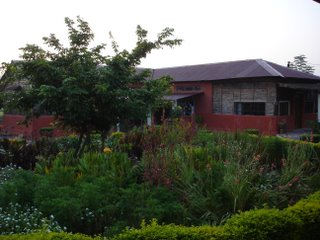 This course was taught by Dr. Melaku Ward, an Ethiopian scientist. Though the course got off to a rough start (instructors changed, course content changed with less focus on women, and there were numerous problems reported by participants about the registration, enrollment, traveling, or payment process). But after a few days, we settled in and began to get to know one another. There were about 20 of us from 12 countries: Ethiopia, Ghana, South Africa, Tanzania, Kenya, India, Sweden, Norway, Brazil, Canada, UK and US. The strong African contingent was the most beneficial part of the course, as they brought a valuable perspective about their work with sustainable agriculture in countries heavily preyed upon by agriculture biotechnology corporations.
This course was taught by Dr. Melaku Ward, an Ethiopian scientist. Though the course got off to a rough start (instructors changed, course content changed with less focus on women, and there were numerous problems reported by participants about the registration, enrollment, traveling, or payment process). But after a few days, we settled in and began to get to know one another. There were about 20 of us from 12 countries: Ethiopia, Ghana, South Africa, Tanzania, Kenya, India, Sweden, Norway, Brazil, Canada, UK and US. The strong African contingent was the most beneficial part of the course, as they brought a valuable perspective about their work with sustainable agriculture in countries heavily preyed upon by agriculture biotechnology corporations.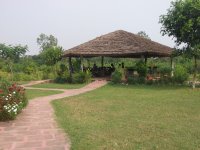
For ten days, our schedule was:
7A Yoga
8A Breakfast
9A Shramdan- service to the community in which we either cooked, cleaned, or worked in the field
11A-1P Morning lecture
1P Lunch
2-4P Afternoon lecture
4P Tea
6P Evening yoga
7P Dinner
One of the best parts of the course was the yoga (and the lemongrass tea. oh, and all the food--yummm)! In the morning, we rose with the sun and performed asanas (poses) in the open air at the beautiful farm with flowers, lemon trees, rice, and millets growing around us was excellent. The evening yoga teacher, Lalitha Ganguly, is a great teacher and transformed my practice. She has trained at Krishnamacharya Yoga Mandiram for over 20 years in Chennai (S. India) and now teaches in Pune (Central West India). During the evening sessions, she worked with us solely on pranayama (breathing) and provided very useful exercises for us to take home with us. She emphasized the importance of remembering our breath in all aspects of our lives, not just during yoga. This is very similar to the philosophy of Jin Shin Jyutsu, which I also practice. A great exercise is sitting quietly and taking 36 relaxed breaths—so rejuvenating!
The lectures had a lot of interesting information on various issues in international agriculture. 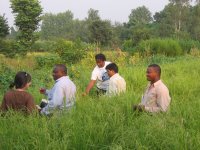 We also got some hands on experience on the farm like visit the seed bank. ‘Bija Vidaypeeth,’ the course site, means School of the Seed. It was co-founded by Satish Kumar and Vandana Shiva for the purpose of saving seed in response to seed patenting and bio-piracy practiced by agriculture, chemical and pharmaceutical multi-national corporations. By taking indigenous knowledge from farmers and villagers and altering it slightly, these companies make huge profits off of seed, chemicals, food products, and medicine. And of course none of the profits are returned to the village.
We also got some hands on experience on the farm like visit the seed bank. ‘Bija Vidaypeeth,’ the course site, means School of the Seed. It was co-founded by Satish Kumar and Vandana Shiva for the purpose of saving seed in response to seed patenting and bio-piracy practiced by agriculture, chemical and pharmaceutical multi-national corporations. By taking indigenous knowledge from farmers and villagers and altering it slightly, these companies make huge profits off of seed, chemicals, food products, and medicine. And of course none of the profits are returned to the village.
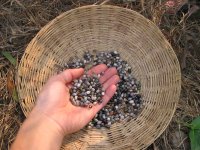 The seed bank at Navdanya has hundreds of varieties of rice and pulses stored in special containers that maintain proper moisture level. There are about 30 rice varieties in production at the farm currently. The seed bank itself was built with cow dung walls. Just as the cow is revered as holy here, so is its waste and for good reason. It is both a great insulator during the winter and keeps the room cool during the summer. Cow dung walls are also a natural insect repellent—good to protect us from those Malaria, Dengue, and West Nile-ridden mosquitoes flying around. All the structures at Bija at built of cow dung with aluminum roofing. Cow dung walls are made simply by mixing cow dung with enough cow urine and a bit of straw to make a solid but moldable consistency.
The seed bank at Navdanya has hundreds of varieties of rice and pulses stored in special containers that maintain proper moisture level. There are about 30 rice varieties in production at the farm currently. The seed bank itself was built with cow dung walls. Just as the cow is revered as holy here, so is its waste and for good reason. It is both a great insulator during the winter and keeps the room cool during the summer. Cow dung walls are also a natural insect repellent—good to protect us from those Malaria, Dengue, and West Nile-ridden mosquitoes flying around. All the structures at Bija at built of cow dung with aluminum roofing. Cow dung walls are made simply by mixing cow dung with enough cow urine and a bit of straw to make a solid but moldable consistency.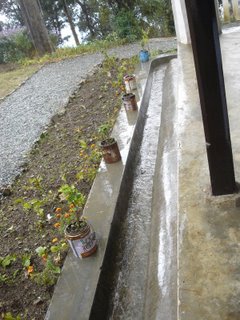
All the farm structures and systems were built with sustainability in mind. Troughs that carry waste and rain water to the fields surround the living structures. There is a huge solar panel for electricity (used to power lights and fans). The main grass hut where the group gathers for yoga and meetings is built atop a huge rainwater catchment. The farm as a whole was an excellent model for the course participants in this regard, as many of them hope to start similar farms in their communities.
To stay in contact and to collaborate in the future, we created the “12 Seed Initiative,” for the 12 countries represented at the class. This is an exciting, concrete outcome of the course and the forum can be viewed at http://groups.google.com/group/12seedinitiative. We also interviewed several of the participants to profile their organizations. Interviews will be aired on radio stations in California (and webcast) upon our return. Here are the brief descriptions:
Jack Wafula
Kenya
SMART Initiative with women farmers, gender, and AIDS issues. Many men refuse to work. Women farm, raise children, and expected to have food on the table when men get home from lying in the sun.
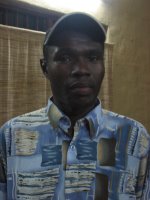 They work to convert farmers to organic by
They work to convert farmers to organic by
- Composting to avoid use of corporate inputs
- Vegetable farming to diversify diet
- Raising fewer cattle
- Using alterative hives for bee keeping. Traditionally trees have been used but trees are becoming fewer and fewer so they work to develop alternative systems to using 1000-year-old trees.
- Developing possibilities to process their own food and start Community Supported Agriculture (CSAs)
The primary issues they address in their work are lack of soil fertility, deforestation, malnutrition, and access to information. They use local resources to manage soil fertility and translate educational material into the local language. To address malnutrition, they plant crops such as corn and cassava to provide all essential nutrients.
Challenges they face are light rainfall, drought, and insufficient means for extension to reach all areas. They have experienced success of farmer mobilization to grow and market crops together. They also have successfully networked with other organizations to share information. They hope for Kenyan farmers to go organic and to save their own seed. They want to develop a Global Alliance to share experience, technology, and information to further development of organic movement and capacity building.
Peter Anthony Kindimba
Ileje rural development organization
Pobox 160 Itumba,Ileje
Mbeya, Tanzania.
 The primary issues they face are food security, market access, gender issues, and local use of resources. To address gender issues, they encourage community members to share resources equally. Agriculture companies come to their farmers with GMO seeds and their organization is working to instead promote organic farming. They encourage farmers to use local resources in stead. Challenges they experience are unsustainable farming methods, food provision for families, and marketing of their products. To solve the problems of farmers, they need assistance in production, trading, and from financial institutions. So far, they have experienced success in formation of farmer cooperatives and networks of farmer groups to overcome their struggles. He hopes to continue farmer collaboration to assist marginalized farmers and to create an information exchange.
The primary issues they face are food security, market access, gender issues, and local use of resources. To address gender issues, they encourage community members to share resources equally. Agriculture companies come to their farmers with GMO seeds and their organization is working to instead promote organic farming. They encourage farmers to use local resources in stead. Challenges they experience are unsustainable farming methods, food provision for families, and marketing of their products. To solve the problems of farmers, they need assistance in production, trading, and from financial institutions. So far, they have experienced success in formation of farmer cooperatives and networks of farmer groups to overcome their struggles. He hopes to continue farmer collaboration to assist marginalized farmers and to create an information exchange.
Ayele Kedebe
Ethiopia
They work to bridge the gap between policy and public understanding by holding public meetings on current legislation. They focus on deforestation, waste management, and the growing population. Working with a network of ten groups, the Forum distributes Green Awards to recognize progress around the country. They publish a tri-annual magazine publication to address the problem of government owning the media. They have experience success in growing environmental awareness and by working with many organizations for cumulative change. They hope to that their work will result in environmentally literal citizens in Ethiopia.
Check out www.ringo.com, search for my name, and look in the Bija Vidyapeeth album for more photos.
No comments:
Post a Comment